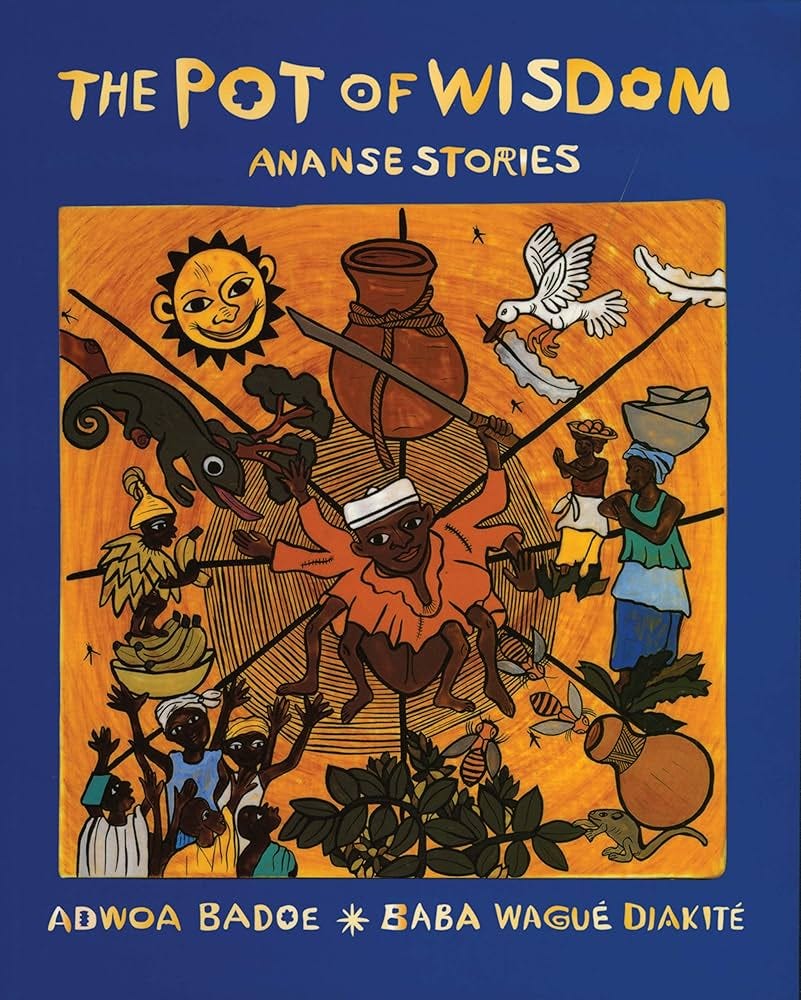The African Spider God Anansi: The Wisdom Of Sharing
Tales Of Gods, Monsters and Men #1
In the vibrant tapestry of West African folklore, one figure stands out for his wit, charm, and invaluable lessons: Anansi the Spider. Known as a trickster and a clever character, Anansi's tales have been passed down through generations, each story rich with wisdom and moral lessons. Let's dive into the fascinating backstory of Anansi, explore some interesting facts about him, and revisit his captivating tales that teach us about the importance of sharing knowledge, fairness, and contentment.
The Backstory of Anansi
Anansi the Spider, also known as Ananse, Kwaku Ananse, and Anancy, is a central figure in West African and Caribbean folklore. Originating from the Ashanti people of Ghana, Anansi is one of the most popular characters in African mythology. His stories were brought to the Caribbean by enslaved Africans, where they evolved and became an integral part of the oral tradition in countries such as Jamaica, Trinidad, and the Bahamas.
Anansi is often depicted as a spider, but he also takes on human characteristics. In many tales, he is portrayed as a wise and cunning character who uses his intelligence to outwit others, often for his own benefit. Despite his trickster nature, Anansi's stories are rich with moral lessons that highlight the values of wisdom, cooperation, and humility.
Interesting Facts About Anansi
Symbol of Resistance: During the transatlantic slave trade, Anansi became a symbol of resistance and survival for enslaved Africans. His stories provided a sense of cultural continuity and resilience in the face of oppression.
Cultural Hero: Anansi is not just a trickster but also a cultural hero. In many stories, he brings essential elements like stories, wisdom, and even food to humanity, often by outwitting the more powerful gods or animals.
Dual Nature: Anansi’s dual nature as both a spider and a man allows him to navigate different realms. This duality symbolizes his ability to adapt and survive in various situations, making him a versatile and enduring character.
Global Influence: Anansi's tales have influenced folklore worldwide. Similar trickster figures can be found in Native American, European, and Asian folklore, showing the universal appeal of his character.
The Tale of Anansi and the Pot of Wisdom
Once upon a time, in a world where stories danced on the lips of the old and young alike, Anansi the Spider decided he wanted to be the wisest of all. He journeyed far and wide, collecting every scrap of wisdom he could find, and stored it all in a large clay pot. Anansi was thrilled with his treasure trove, but he didn't want to share his newfound wisdom with anyone. He decided to hide the pot at the top of a tall tree where no one could reach it.
Anansi tied the pot to his stomach and began to climb the tree, but the pot kept getting in his way. His son, Ntikuma, watched from below and suggested, "Father, why don’t you tie the pot to your back instead?" Anansi, annoyed that his son had thought of something he hadn't, reluctantly tied the pot to his back. With this new approach, he easily climbed the tree.
At that moment, Anansi realized that even though he had gathered all the wisdom, he didn’t possess it all. The wisdom of his young son had proven valuable. Frustrated, Anansi hurled the pot to the ground, shattering it. The pieces of wisdom scattered everywhere, reaching every corner of the world.
Key Takeaways from Anansi's Tales
Wisdom is Not Exclusive: Anansi’s story teaches us that wisdom isn’t meant to be hoarded. It thrives when it is shared and accessible to everyone. By keeping knowledge to ourselves, we limit its potential to benefit the greater good.
Learning is a Lifelong Process: No matter how much you think you know, there’s always more to learn. Anansi’s frustration at his son's suggestion reminds us that valuable insights can come from anyone, regardless of age or experience.
Collaboration Breeds Innovation: Sharing knowledge fosters collaboration, which can lead to innovative solutions and new perspectives. Anansi’s act of scattering the wisdom, albeit accidental, symbolizes the power of collective intelligence.
Fairness and Generosity Matter: The tale of Anansi and the Turtle highlights the importance of treating others with fairness and generosity. Trickery and selfishness may yield short-term gains but often result in long-term consequences.
Contentment Over Greed: Anansi’s encounter with the magic yam teaches us that greed can lead to our downfall. True happiness comes from appreciating what we have and being content with it.
Actionable Pieces of Advice
Share Your Knowledge: Whether it’s at work, in your community, or among friends, make a habit of sharing what you know. Offer to mentor someone, write articles or blog posts, or simply engage in meaningful conversations where you can impart your insights.
Stay Open to Learning: Adopt a mindset of continuous learning. Be open to new ideas, no matter where they come from. Attend workshops, read books, and listen to others. Remember, wisdom is not confined to textbooks or age; it’s all around us.
Encourage and Appreciate Different Perspectives: Create environments, whether at home or work, where different perspectives are valued. Encourage brainstorming sessions and collaborative projects where everyone has a voice. This diversity of thought can lead to richer, more innovative solutions.
Mentor and Be Mentored: Mentorship is a two-way street. While you may have valuable knowledge to impart, always be willing to learn from those you mentor. This reciprocal relationship can foster mutual growth and development.
Foster a Community of Sharing: Build communities—whether online or offline—where sharing knowledge is encouraged and celebrated. Participate in forums, join clubs or societies related to your interests, and contribute actively to discussions.
Practice Fairness and Generosity: Treat others with fairness and generosity. Recognize that short-term gains achieved through trickery or selfishness can lead to long-term losses. Instead, build relationships and trust through kind and equitable actions.
Cultivate Contentment: Appreciate what you have and practice gratitude daily. Avoid the trap of endless desire for more. Find joy in the simple things and share your blessings with others.
Conclusion
Anansi the Spider's tales are more than just stories; they’re timeless lessons on the power and importance of sharing wisdom, learning continuously, practicing fairness, and cultivating contentment. In a world that often values individual achievement, Anansi teaches us that true wisdom and progress come from collective effort and shared knowledge. Let’s take a leaf out of Anansi’s book and strive to create a world where wisdom flows freely and benefits all. Remember, the pot of wisdom belongs to everyone, and fairness, generosity, and contentment enrich our lives and communities.
The Dark Tale of Anansi and the Chameleon
In the world of folklore, Anansi the Spider is known for his cunning and wit, but not all of his tales are lighthearted. Among the many stories, there is a particularly dark one that reveals the more sinister side of Anansi’s character. This story is a cautionary tale about greed, betrayal, and the consequences of one’s actions.
Anansi and the Chameleon
In a village far away, Anansi the Spider lived among other animals, always plotting and scheming to get ahead. His closest friend was Chameleon, a creature known for his ability to change colors and blend into his surroundings. Despite their friendship, Anansi’s greed and desire for power often led him to betray those around him.
One day, the village chief announced a competition: whoever could bring the most food to the village feast would be rewarded with a position of great honor and immense wealth. Anansi, eager to win the prize, immediately began devising a plan to secure his victory. He knew that Chameleon, with his ability to blend in, could easily gather food without being noticed.
Anansi approached Chameleon and proposed they work together. He suggested that Chameleon gather food during the day while he, Anansi, would collect food at night. Chameleon, trusting his friend, agreed to the plan.
Chameleon worked tirelessly, gathering fruits, vegetables, and grains, while Anansi pretended to do the same. However, Anansi had no intention of sharing the prize. Each night, while Chameleon slept, Anansi would sneak into Chameleon’s stash and steal the food, adding it to his own pile.
As the day of the feast approached, Chameleon grew suspicious. He noticed that despite his hard work, his food pile seemed to shrink while Anansi’s pile grew larger. Realizing he had been betrayed, Chameleon decided to teach Anansi a lesson.
On the night before the feast, Chameleon collected a special plant known for its toxic properties. He carefully mixed it into the food that he had gathered, knowing that Anansi would steal it that night. As expected, Anansi came to steal the food, oblivious to the trap that had been set.
The next morning, Anansi proudly presented his stolen food to the village chief, boasting about his hard work. Chameleon, meanwhile, stayed silent, waiting for the right moment. As the villagers began to eat the feast, they quickly realized something was wrong. The food was poisoned, and those who ate it fell gravely ill.
The village chief, furious and suspicious, demanded an explanation. Chameleon stepped forward and revealed Anansi’s treachery. He explained how Anansi had stolen his food and how he had set the trap to expose Anansi’s greed. The villagers turned on Anansi, condemning him for his actions.
As punishment, Anansi was banished from the village, forced to wander alone, shunned by the community he had once betrayed. His greed and deceit had led to his downfall, serving as a dark reminder of the consequences of betrayal and dishonesty.
The Moral of the Dark Tale
This darker story of Anansi serves as a stark warning about the dangers of greed and betrayal. It teaches us that:
Trust Should Not Be Betrayed: Trust is a precious commodity, and betraying it can lead to severe consequences. Anansi’s betrayal of Chameleon’s trust led to his isolation and downfall.
Greed Can Lead to Ruin: Anansi’s insatiable greed blinded him to the importance of integrity and honesty. His desire for wealth and power ultimately resulted in his punishment.
Deception Has Consequences: While Anansi was known for his cunning, his deceitful actions caught up with him. This story illustrates that deception, no matter how clever, can have dire repercussions.
Karma and Justice: The story also emphasizes the concept of karma and justice. Anansi’s actions came back to haunt him, showing that people often face the consequences of their misdeeds.
Conclusion
The dark tale of Anansi and the Chameleon offers a more somber perspective on the legendary trickster. It serves as a powerful reminder that while cleverness and wit can be advantageous, they should not be used to harm or deceive others. This story, like many others featuring Anansi, is rich with moral lessons that are as relevant today as they were when they were first told.






